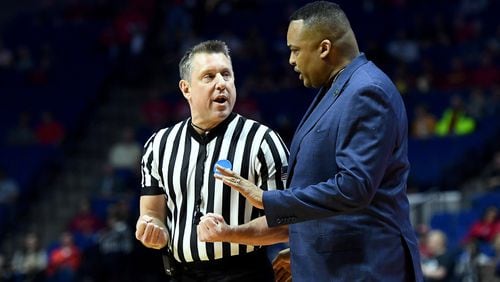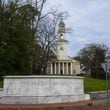Ron Hunter, the men's basketball coach with the most wins in Georgia State history, abruptly left for Tulane despite a third appearance in the NCAA tournament during his seven-year tenure.
What went wrong?
The Atlanta Journal-Constitution gained insight into the breakdown between school and coach with information obtained through an Open Records request.
Georgia State actively tried to keep Hunter, offering him a raise of almost $25,000 per year, but negotiations on a contract extension that began in April 2018 broke down over two points: Hunter’s opposition to a contract that included a bonus tied to academic performance, and the terms of buyouts.
Hunter accepted the job with Tulane last week, leaving Georgia State with a record of 171-95 and three appearances in the NCAA tournament in the past five years.
Communication between deputy general counsel for Georgia State, Bharath Parthasarathy, and Hunter’s agent, Jordan Bazant, stopped Oct. 7, 2018, according to email and text messages obtained by the AJC. In previous communications over six months, several emails and text messages, from both parties, also requested telephone calls to discuss negotiations. There were no such further requests, from either party, after Oct. 7.
During the negotiations, there was agreement in the key area of salary.
In an email exchange between Parthasarathy and Bazant on Sept. 23, the two sides agreed to a base salary of $575,000 (an increase from Hunter’s salary of $551,565) with an annual appearance bonus of $50,000 (unchanged from his contract).
The two sides couldn’t come to an agreement over the bonuses or buyouts.
In messages to Hunter and Bazant, Georgia State expressed concerns that the average grade-point average for scholarship men’s basketball players for 2017-18 was projected to be 2.16, a declining trend for the previous years that could lead to a loss of substantial revenue from the NCAA. The buyout proposals varied substantially between the two parties, with Bazant asking for as much as $2.1 million should the university terminate Hunter.
Bazant proposed in the Sept. 23 email that if the scholarship athletes have an average GPA of 2.5, all of Hunter’s bonuses should be doubled, and that Hunter’s buyout should he choose to leave would be $300,000 for each year. Georgia State had offered that Hunter should receive only two of the bonuses tied to academic performance should the scholarship athletes have an average GPA of 2.5. It also had proposed that should Hunter choose to leave, his buyout would start at $700,000 in 2018-19 and drop incrementally to $175,000 in 2021-22.
Reflecting what may have been information proposed by Bazant in a phone call to the attorney, Georgia State in an email asked him to share similar contract terms of other clients. If Bazant shared that information, it wasn’t done by email.
Email exchanges between the Georgia State attorney and athletic director Charlie Cobb indicate neither received the info from Bazant.
On Oct. 3, Georgia State emailed Bazant rejecting his proposals. Bazant responded the same day asking for Cobb’s rationale, saying they had yet to hear from him. Cobb had shared his rationale in correspondences with Hunter the previous summer. Hunter’s relationship with Cobb remained cordial throughout the men’s basketball season, which ended with a loss to Houston in the first round of the NCAA tournament March 22.
It was expected by Georgia State officials that the two parties would renew discussions following the season.
But that Oct. 3 email communication was the last correspondence between the parties about Hunter’s contract. They didn’t talk again until March 26, when it was time to discuss the buyout of Hunter’s contract after he had accepted the job at Tulane.
Georgia State and Bazant declined to comment for this article.
Hunter, in a text exchange with Cobb last summer, said that he wanted to stay at Georgia State. Now he is gone.
The Open Records request asked for correspondence dating from Jan. 1, 2018 until March 27, 2019. The first correspondence took place in an email between Bazant and Cobb on April 30.
In the correspondence, Bazant wrote that Hunter wanted to remain at Georgia State “for the foreseeable future” and wanted a five-year contract agreement based upon a comparative analysis of what men’s basketball coaches are paid in Conference USA and the Mountain West Conference. Bazant asked for a contract of $675,000 with a buyout of $1.4 million if Hunter were terminated without cause and $675,000 if Hunter chose to leave.
On May 31, in an exchange between Hunter and Cobb, the athletic director proposed a $625,000 base salary that included the appearance bonus of $50,000. The buyout should Georgia State terminate Hunter would start at $1.4 million in 2018-19 and decrease incrementally to $350,000 in 2021-22. Should Hunter choose to leave, he would owe $700,000 in 2018-19. The 2:1 ratio of buyouts was requested by Georgia State President Mark Becker, according to Cobb.
Cobb noted that any extension must include an academic standard because “the new NCAA Academic money uses these metrics and the potential income to the department is too substantial to ignore.”
Hunter responded by writing that they “had agreed on a three-year extension. I will be honest there is absolutely no negotiation with this process. I also do NOT want to add a 2.5 GPA to get my bonuses. If the salary ($625,00) isn’t negotiable I would like the 3 year extension at the same rate.”
On June 18, Bazant emailed Cobb, again proposing a base salary of $675,000 with a buyout of $2.1 million if Georgia State were to fire Hunter in 2018-19, with incremental decreases to $350,000 in 2023-24. Should Hunter choose to leave, Bazant proposed a $650,000 buyout owed to Georgia State in 2018-19, decreasing incrementally to $400,00 in 2022-23.
Cobb emailed Bazant two hours later, responding that compensations for coaches in Conference USA and the Mountain West aren’t applicable to Georgia State, and countered with a base salary of $625,000 in 2018-19. Cobb also noted that the buyouts proposed were too large. For that reason, he preferred a two-year extension compared with a three-year extension. Cobb also notes his concern about the team’s declining average GPA.
Between June and September, Cobb handed over negotiations to Parthasarathy.
On Sept. 18, Parthasarathy wrote to Bazant that the university can commit to a two-year extension through April 30, 2022. The base salary proposed was $575,000 (an increase from Hunter’s current salary of $551,565) with an annual appearance bonus of $50,000 (unchanged from his contract).
Parthasarathy noted that most employees in the University System of Georgia were receiving 2 percent raises. Hunter’s raise would have been 4.24 percent.
Georgia State also noted the declining GPA for the men’s basketball team. The average GPA for players on scholarship decreased from 2.43 in 2014-15 to 2.22 in 2016-17. The team GPA decreased from 2.44 in 2014-15 to a projected 2.31 in 2017-18.
Parthasarathy notes that it “has tried to get the Men’s Basketball team invested in changing this trend over the years and hasn’t had buy-in amongst the team.” Noting it believes Hunter cares for the players, the school proposed a change of two separate bonuses in his contract requiring that for him to receive the money, the team had to have an annual GPA of 2.5 or higher.
Regarding buyouts, Parthasarathy wrote that should Hunter choose to leave, he would owe Georgia State $700,000 in 2018-19, with the amount dropping incrementally to $175,000 in 2021-22.
With regard to the university firing Hunter, Georgia State proposed buyouts of $1.4 million in 2018-19, dropping incrementally to $350,000 to 2021-22. Should Hunter choose to leave, his buyout would start at $700,000 in 2018-19 and drop incrementally to $175,000 in 2021-22.
The first reports of ties between Hunter and Tulane came during the NCAA tournament game against Houston. Several media outlets, including the AJC, reported that Tulane was a possible destination after the Green Wave went winless in the American Athletic Conference this season and fired coach Mike Dunleavy on March 16.
Hunter later indicated that he had conversations with Tulane well before the NCAA tournament. In his introductory news conference in New Orleans, Hunter said he told his wife that he was interested in making a move to the program while he was with Georgia State watching the NCAA selection show at a restaurant in Mississippi on March 17, the day the team won the Sun Belt Conference tournament in New Orleans.
As part of the Open Records request, the AJC asked for correspondences from Hunter to Cobb regarding Tulane. There were none. Hunter’s contract required him to notify Cobb of any interest from other programs.
Several days after Hunter’s decision to leave for Tulane, Cobb finally met with the basketball team to inform them of the coaching change. Georgia State has since appointed Travis Williams, a former Panthers player, as interim coach.
About the Author







